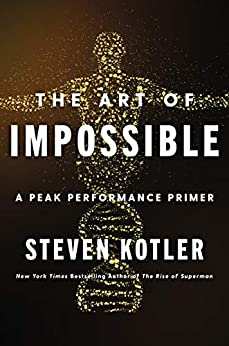Steven Kotler is a journalist and a bestselling author, whose purpose (among two others) is to advance the science of flow. Flow is the term coined by Mihaly Csikszentmihalyi describing the state of consciousness in which we feel our best and perform our best. We are fully focused on the task at hand and the time is passing differently (either it is slowing down or speeding up). Flow is a natural state. And the mix of neurochemicals that are produced during this state causes that our brain searches to be in that state. Our brain tries to remember what had led to this state, which explains enhanced memory during flow.
Steven Kotler has devoted many years and done many experiments to find the answers to the questions of peak performance. His book is trying to answer the question of how some people can perform things that others think are impossible. The key ingredient of the recipe is flow. But it is not the only one.
Author underlines on multiple occasions, every person is different and his goal is not to find a solution that works for one individual but one that many people could apply. He searches therefore for the answers in biology. What he wants to achieve is to show how we can use our biology to work for us and not against us. The idea is to discover certain mechanisms in our bodies, brains and minds and use them to achieve our goals with smaller effort. Things we naturally gravitate to should be on our radar. And the intersection of many subjects should give us enough motivation to pursue it further. Addressing our curiosity a little at a time will finally build expertise which, mixed with an overarching purpose, is a fuel that enables achievement.
Motivation
Steven Kotler tries to decompose motivation as one of the factors that lead to achievement of Impossible. It comprises drive grit and goals. Motivation needs to be huge in order to achieve great things. That’s why, after analysing research in motivation, Steven suggests stacking and aligning multiple motivation building blocks. First, it is good to find intersection of multiple things that we naturally gravitate to, then set a goal that can only be achieved by doing things we are curious about or even passionate. On top of that, we should find a purpose – a goal that is not related to us directly but aims to resolve a greater problem.
Grit
Author often states that achieving impossible feats doesn’t involve doing extraordinary tasks every day, contrary it involves doing the same small steps every day which will bring the Impossible closer to us. In such perspective the grit is required. Grit, term coined by Angela Duckworth, is a mixture of passion and perseverance. And if achieving the impossible is a boring every day checklist, then we need a lot of grit. One exercise that helps in building grit is taken from another peak performer, Josh Waitzkin, whose book I’ve already described here. Josh suggests trying to perform best when we’re at our worst. The point is to work in very demotivating circumstances. For example, finish a training with a difficult exercise or practice a speech while hiking after the whole day of work.

